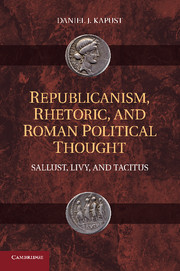Book contents
- Frontmatter
- Contents
- Acknowledgments
- 1 Introduction
- 2 An Ambiguous Republican
- 3 Channeling Conflict through Antagonistic Rhetoric in the War with Catiline
- 4 Exemplarity and Goodwill in Livy's From the Founding of Rome
- 5 Tacitus on Great Men, Bad Rulers, and Prudence
- 6 Tacitus' Moral Histories
- Epilogue
- Bibliography
- Index
- References
4 - Exemplarity and Goodwill in Livy's From the Founding of Rome
Published online by Cambridge University Press: 03 May 2011
- Frontmatter
- Contents
- Acknowledgments
- 1 Introduction
- 2 An Ambiguous Republican
- 3 Channeling Conflict through Antagonistic Rhetoric in the War with Catiline
- 4 Exemplarity and Goodwill in Livy's From the Founding of Rome
- 5 Tacitus on Great Men, Bad Rulers, and Prudence
- 6 Tacitus' Moral Histories
- Epilogue
- Bibliography
- Index
- References
Summary
INTRODUCTION
Sallust's Rome was marked by antagonism and centrifugal energies, constrained – though not eliminated – by collective fear. Conflict and competition between individuals and groups threatened to imperil the community, yet conflict and competition – rightly shaped and manifested – were also the source of the community's strength. The constraint provided by the fear of foreigners channeled and structured this competition; with the removal of this constraint, the energies that had been directed toward the common good began to be turned toward private concerns. Yet the antagonism of rhetoric, practiced by outstanding individuals, held the potential of checking this conflict by transforming it into political contestation and helping to create a space for the expression of tensions in the body politic. This check, however, was contingent and relied upon the practice of antagonistic rhetoric on the part of outstanding individuals.
I argue in this chapter that Livy, as opposed to Sallust, navigates the conflicts that emerge in republics by emphasizing consensus and accommodation. Consensus emerges in the context of conflict and competition, to be sure, but the driving force behind this consensus is goodwill: goodwill directed toward individuals that paves the way for broader-based consensus between individuals and groups. This goodwill is rooted in the friendly attraction to and admiration for virtue, and is akin to the ethos- and pathos-based relationships between speaker and audience. Rhetoric and its tools thus provide Livy with a foundation for building and maintaining consensus.
- Type
- Chapter
- Information
- Republicanism, Rhetoric, and Roman Political ThoughtSallust, Livy, and Tacitus, pp. 81 - 110Publisher: Cambridge University PressPrint publication year: 2011

